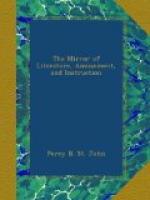[14] From the Private Correspondence of a Woman of Fashion.
I found poor Holloway this morning foaming with rage in the Cartoon Gallery. Some person has written against the Cartoons, denominating them “washed daubs.” No doubt it is either the pen of envy and malignity, or of ignorance: n’importe, it has wounded the feelings of a superior artist and a good man, who worships with religious enthusiasm those works of Raphael, and who has spent so many years in perfecting his engravings of them. It was a grotesque scene to behold Madame Bouiller pacing after Holloway up and down the gallery, with all the grimaces and vivacity of a Frenchwoman, and re-echoing his furious lamentations.
* * * * *
Edinburgh (by Mr. Cobbett).—I thought that Bristol, taking in its heights and Clifton, and its rocks and its river, was the finest city in the world; but Edinburgh, with its castle, its hills, its pretty little sea-port, conveniently detached from it, its vale of rich land lying all around, its lofty hills in the back ground, its views across the Frith;—I think little of its streets and rows of fine houses, though all built of stone, and though everything in London and Bath is beggary to these; I think nothing of Holyrood House; but I think a great deal of the fine and well-ordered streets of shops—of the regularity which you perceive everywhere in the management of business; and I think still more of the absence of all that foppishness, and that affectation of carelessness, and that insolent assumption of superiority, that you see in almost all the young men that you meet with in the fashionable parts of the great towns in England. I was not disappointed; for I expected to find Edinburgh the finest city in the kingdom. Conversations at Newcastle, and with many Scotch gentlemen for years past, had prepared me for this; but still the reality has greatly surpassed every idea that I had formed about it. The people, however, still exceed the place: here all is civility; you do not meet with rudeness, or even with the want of a disposition to oblige, even in persons in the lowest state of life. A friend took me round the environs of the city; he had a turnpike ticket, received at the first gate, which cleared five or six gates. It was sufficient for him to tell the future gatekeepers that he had it. When I saw that, I said to myself, “Nota bene: Gate-keepers take people’s word in Scotland—a thing that I have not seen before since I left Long Island.”
* * * * *
King John—died at Swinshead Abbey, in Lincolnshire; his body was interred at Worcester; his bowels in Croxton Abbey Church, in Leicestershire, the abbot being his physician; and his heart at Croxden, in Staffordshire. Perhaps the most precious portion of his relics would be the hand that signed Magna Charta. (See page 279.)
* * * * *




